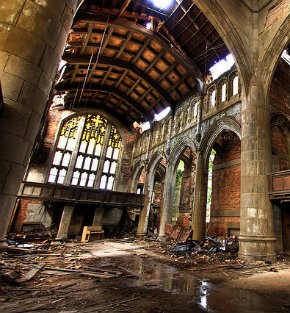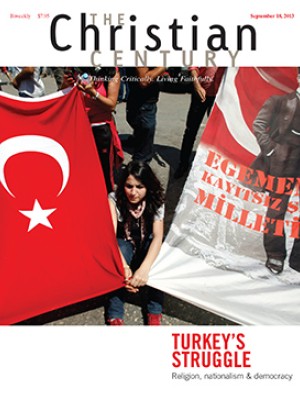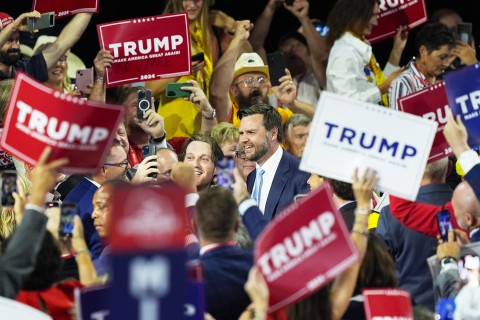The good kind of liberalism: Reviving a theological tradition
Does liberal theology still exist? Of course it does, many will reply: liberal Christianity certainly exists; liberal Christians reflect on their faith, and such reflection is liberal theology.
But those who are familiar with academic theology will be wary of answering with such certainty. They will be aware that liberal theology suffered a huge collapse in the second half of the 20th century from which it has not recovered. No substantial attempts to revive the theoretical basis of liberal theology have arisen for a generation or more.
Some will say that the absence of any new liberal theological theory doesn’t matter. Maybe theology these days is a more pragmatic phenomenon, an ad hoc thing. Liberal (or “progressive”) Christian communities are arising (or “emerging”) in new forms, and they do not need a professor to supply a theoretical basis for them. They just get on with relating the gospel to the needs of the world, proclaiming the God of justice for all people. Let’s not get hung up on labels; let’s just be Christian.
Read our latest issue or browse back issues.
This is not a satisfactory response. We are also called to think about our creed in bold, abstract terms. Otherwise the intellectual high ground belongs to other forms of Christianity, and the most intellectually talented people will gravitate to them, sensing that liberal theological tradition is satisfied to wallow in well-meaning muddle, that it lacks the vision to put its intellectual house in order.
We therefore need a bold account of why liberal theology collapsed and of how it can be revived. This perhaps sounds rather obvious: surely, after a collapse, any tradition must redefine itself, ask what must be preserved and what must be jettisoned. But over the recent decades liberal theology has been strangely blind to this task. Why?
Partly because its late 20th-century collapse was so dramatic that most theologians wanted to distance themselves from the whole tradition, as if to avoid infection by it. Also, the dust from such a dramatic collapse has simply taken a long time to settle.
I suggest that enough of the dust has settled for a fundamental new approach to liberal theology to be possible. We can now see what went wrong with liberal theology and why its collapse was largely necessary. We can also sketch a new sort of liberal theology.
The key to understanding liberal theological tradition is to see that liberal means two things in theology. The two traditions became deeply intertwined in the modern period, but it is possible to separate them. To put it bluntly, there is a good tradition of liberal theology and a bad tradition.
The good tradition of liberal theology is that which affirms a deep affinity between the gospel and political and cultural liberty. These things don’t exist in the abstract; they exist when a state promotes and protects them. Good liberal theology affirms the liberal state. Indeed, it was this tradition that first imagined the liberal state, in the mid-17th century. It rejected the assumption that a state needed religious unity (or “unitary theopolitics”), and it proposed liberty as the authentic basis for future national unity.
This narrative has, to put it mildly, fallen out of fashion. The narrative of the liberal state is generally told by secular thinkers, who unsurprisingly downplay religion’s positive role. And, a bit more surprisingly, the most influential theologians agree, for they see liberalism as an essentially anti-Christian tradition. This fairly simple narrative—liberalism as a secular invention—suits both secularists and neoconservative theologians. But it is false. Before the secular Enlightenment gained traction, specifically Christian idealism imagined the essential outline of the liberal state. Liberal Christianity must regain pride in this narrative.
It is, of course, a complicated story. And it is hard to say where it begins. The New Testament obviously has no conception of modern political liberty. But it already contains certain seeds of it: it detaches God from any form of state power and it rejects theocracy.
This insight, after a long Constantinian hibernation, is basic to the emergence of the liberal state. Also, Paul’s theme of spiritual liberty, freedom from a religious law, finds very gradual cultural and political application. Luther’s subjection of religion to secular political control was a step toward the liberal state, but it was an indirect or sideways step, for toleration remained taboo. The breakthrough came in the mid-17th century. The strange idea emerged that the state should move toward complete toleration and cease to uphold an official, established religion—so that a purer Christian culture could emerge.
The proponents of this idea, such as John Milton and Roger Williams, were influenced by sectarian radicals, especially Anabaptists, who denounced the fusion of Christianity and state violence, but these radicals were apolitical fatalists who saw politics as irredeemably corrupt. The new idea was that this radical purism could be fused with a positive political ideal: a new sort of state that protected religious liberty. Instead of claiming to promote the true religion, and corrupting what it promoted through its violence, the state could promote religious liberty, and so allow true religion to flourish. Thus liberal Protestantism gave rise to the liberal state.
Am I really affirming this old, much-derided narrative? Yes. Liberal theology insists that the liberal state (which it helped to found) is the proper context for Christianity. It says that part of one’s modern Christian duty is nurturing this sort of politics.
But of course there is more to be said. For at around the same time as the rise of the liberal state, the “bad” tradition of liberal theology gets moving.
The bad tradition of liberal theology is that which seeks to reform Christianity in the direction of rationalism and optimism about natural human capacities—a direction that can probably be summed up as “humanism” without too much confusion. Soon after the Reformation this ideal deeply infected much of Protestantism.
This version of faith can be critiqued in different ways. It can be accused of denying certain core Christian doctrines (the more Protestant response) or of denying Christianity’s basis in certain cultic practices (the more Catholic response). These critiques overlap. This liberal theology fails both to proclaim and to ritually perform the saving authority of Jesus Christ. In its attachment to universal rationality, it fails to affirm the particularity of Christianity, expressed in certain ritual practices and speech forms (celebrating the Eucharist, proclaiming God’s word) that are intrinsically authoritative.
The most obvious form of this tradition was deism, which located the essence of Christianity in rational morality while sidelining or dispensing with its outmoded “superstitious” forms. It inherited and intensified the Reformers’ aversion to Roman ritualism. Of course, full-strength deism, which rejected the core Christian doctrines, was officially condemned, but a milder form was tolerated—and set the terms of theological debate (for example, in John Locke’s work).
The landscape only half changed with the advent of Romantic ideas about the social nature of humanity and the value of tradition. Thinkers such as Kant, Hegel and Schleiermacher claimed to reject deism, but in fact they recycled it. They continued to downplay or denigrate Christianity’s cultic basis—its reliance upon the particular speech forms and sacramental actions of worship.
So liberal theology in the 19th century was a hybrid of the good and bad traditions. Unfortunately, the assumption grew ever stronger that this was one tradition, to be either accepted or rejected. In the early 20th century, Karl Barth strengthened this assumption when he rejected it.
Barth’s revolt against liberal theology was both right and wrong. He was right to say that liberal theology was riddled with rational humanism. He was wrong to forget the presence of the good amidst the bad: the tradition that affirms the affinity of Christianity and the liberal state.
Despite Barth’s protest, liberal Protestantism seemed in fine fettle in the mid-20th century. But this appearance was an illusion. A strong theological reaction against it was brewing, partly rooted in Barth, yet increasingly informed by secular philosophy and Catholic thought. By the 1980s, the tide had turned in favor of “postliberal” theology. It seemed that the only really durable forms of theology were ones deeply skeptical of the entire Enlightenment project, and which understood the primacy of ecclesial and doctrinal particularity.
A broad new alliance of Barthians and Catholics (and Anglo-Catholics) reshaped academic theology. A new breed of quasi-Barthian polemicist emerged. Stanley Hauerwas attacked the overlap of liberalism and American nationalism, and John Milbank intensified the Anglo-Catholic case against liberal theology. Such thinkers trumpeted their contempt for liberalism. By “liberalism” they principally mean the rational individualism of the Enlightenment, but they imply that the ideal of the liberal state is tainted by this wider tradition. Do they not admit that the liberal state is on balance a good thing, or at least a less bad thing than any known alternative? They evade the question, focusing on the deficiencies of the liberal state, fantasizing about the hypothetical possibility of a less secular modernity.
I am suggesting that this antiliberal era in theology should end. It is bad for Christian proclamation. New clarity is needed that the liberal state is a good thing. It should be affirmed as the proper modern context for Christianity.
Of course, secular liberal culture must be criticized as shallow, atomized and hedonistic. Our business is fostering a new sort of culture centered on worship. But this must occur within the liberal state. So the Christian’s attitude to liberalism is that of the responsible citizen’s attitude to freedom of speech: it can be affirmed without thereby affirming whatever people feel free to utter. It can be affirmed as context.
This is a difficult balancing act: one must affirm liberalism’s insistence upon freedom, yet resist its pseudo-religious reverence for mere freedom and its subtle disparagement of a fuller, thicker account of the good.
The task that emerges from this analysis is not the revival of liberal theology but its purgation, through rejecting the deficient, humanist-inclined tradition. But this is better described as reinvention.
The only alternatives to this task are a reactionary antiliberalism, or a perpetuation of flawed liberalism, or a muddled mix of the two. Only a reinvented liberal theology can substantially revive the cultural fortunes of Christianity in the West.







